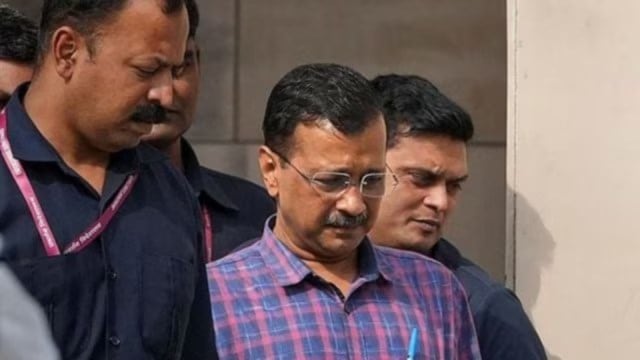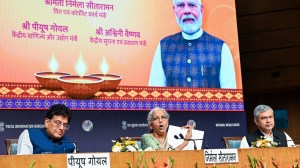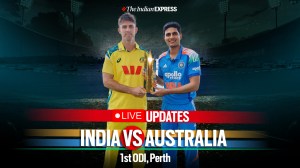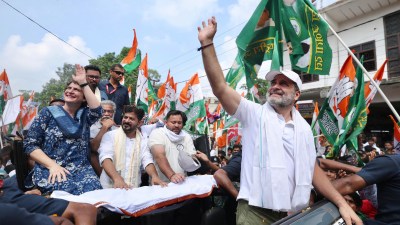Stay updated with the latest - Click here to follow us on Instagram
Excise policy case | CBI move an ‘insurance arrest’: Kejriwal tells HC, cites ex-Pakistan PM Imran Khan’s example
In a hearing being held by the high court on a court holiday, Kerjiwal's senior counsel not only assailed his arrest by the CBI but also sought his release on bail in the case.
 Kejriwal was arrested by the CBI on June 26 from Tihar Jail, where he is still lodged in judicial custody in a connected money laundering case filed by the Enforcement Directorate (ED). File photo
Kejriwal was arrested by the CBI on June 26 from Tihar Jail, where he is still lodged in judicial custody in a connected money laundering case filed by the Enforcement Directorate (ED). File photoChief Minister Arvind Kejriwal told the Delhi High Court on Wednesday that his arrest by the CBI in a corruption case linked to the excise policy is an “insurance arrest” to ensure that he remains in prison. The CBI did not have any material against him, he said.
After hearing arguments of both sides – Kejriwal and the CBI – a single judge bench of Justice Neena Bansal Krishna reserved its verdict in the Chief Minister’s plea challenging his arrest on June 26 and his interim bail plea. The court listed his main bail application on July 29.
Emphasising that the CBI arrest was “unfortunately an insurance arrest”, senior advocate Abhishek Manu Singhvi, who appeared for Kejriwal, said: “Why I say this is because clearly the CBI did not want to and did not intend to and had no intent to arrest him. But somehow in June 2024, feeling that in case he came out on other charges, you arrested him. The dates, material and grounds of arrest make it clear.”
Referring to the interim bail granted to Kejriwal by the Supreme Court to campaign for elections in May, the interim bail granted to him by the apex court recently and the bail granted to him by the trial court last month, Singhvi said, “In a manner of speaking, I have three release orders. Those three release orders were given under much more stringent provisions (PMLA). My case today before your Lordship is relatively much easier, if I may be permitted to use that word. Because your Lordship does not have the stringency of PMLA and does not have the twin condition of Section 45 PMLA…”
Singhvi also referred to cases against jailed former Pakistan Prime Minister Imran Khan. “Three days ago, everybody read in the newspapers that in case after case Imran Khan was released. The man is coming out of jail and he is arrested in a new case… It can’t happen in our country,” he said.
“Please don’t misunderstand me. I hold the CBI in high regard. I’m saying that the thinking can’t be that out and back in. Ultimately, we will fight it but the process is the punishment,” he said.
Responding to this, advocate D P Singh, appearing for the CBI, said, “They (petitioner) have very vehemently said they have been released in three orders (in the ED case). The first order (interim bail to campaign for Lok Sabha polls) is from May 10… Please see in what circumstances, does it even merit to say it was a release that they can boast about? Or was it a release about a democratic process? We are not Pakistan as argued by them. That’s the strength of our judicial system. But it cannot be used the way they are trying to use.”
Singhvi said the CBI FIR was registered in August 2022 in which he was not named. Kejriwal was summoned as a witness on April 14, 2023. He had thereafter appeared where he was questioned for nine hours, he said.
“I ask myself, this is happening in April (2023), 8 months of 2023 go by. It’s 240 days, and the CBI didn’t think it fit to arrest or interrogate me… On March 21, exactly 11 months after recording for nine hours… after the model code of conduct comes into force, I am arrested by ED,” he said.
“With great respect, it is the rarest of rare case I have found that you are in custody and my custody is required by CBI… Admittedly, the power is there, nobody is questioning… From March we go to order of May 10. The SC grants me release, although for three weeks. SC doesn’t think that I can tamper with witnesses, or I can fly away to England… and the SC tests my bonafide.”
When Kejriwal was produced before the vacation judge in June, Singhvi said, the CBI started the procedure of asking for custody, remand and interrogation before the trial court. He said Kejriwal was arrested on June 26, and then on July 12 he was granted interim bail in the ED case.
“But unfortunately for me, I am back to square one because of an insurance arrest. That is what is wanted by those who are doing this that by hook or by crook, more by crook and less by hook, he (Kejriwal) should remain behind bars,” Singhvi said.
On the issue of Section 41A CrPC, Singhvi argued that there can’t be a violation of liberty except by procedure established by law.
“I am already in custody… an application is made to examine me in judicial custody. But I never get a copy of this application. No notice is given, order is passed. Application is allowed the same day on June 24. This is not a post office system,” he said.
Singhvi said that thereafter another application is made seeking permission to arrest him, stating only “one reason”: the petitioner is “not giving satisfactory answers”.
On the CBI’s plea that Kejriwal gave evasive replies during questioning, Singhvi said there can’t be a subjective view and “what is true is what the accused says is true and not what the interrogator wants to hear”, and this is to be ultimately decided by the court.
On the CBI’s contention that new evidence had emerged of Kejriwal’s role as conspirator, Singhvi said that as per the agency a statement by one Magunta S Reddy was recorded in January 2024. Singhvi said this was “six months earlier” but CBI did not arrest him until June. He said the material which the CBI had on the day they wanted to talk to Kejriwal and not arrest, was the same when he was actually arrested the next day.
Countering Kejriwal’s plea, advocate D P Singh, appearing for the CBI, said that while accused have all special privileges and rights, the privileges with investigation agency are “far less”.
“As a prosecutor, I don’t have a privilege to use terms which statute doesn’t permit and does not have meaning. Power of arrest is one thing, having it being tested is another thing. Then for you to use the term (insurance arrest) is not justified,” he said.
On Kejriwal’s role, Singh said, “He is the CM. His role to start with was not apparent… When it came to a point that his role was also relevant he was called… Urgency is to finish the investigation so I’m doing it. At that time I also found other relevant material…”
On Kejriwal’s arrest, Singh said, “He is a public servant and the agency had to collect material and obtain sanction. The Prevention of Corruption Act requires permission to investigate. To take this permission I have to have all the material.”
“In January, I had Magunta Reddy’s statement, by April, I had sanction. Sanction has to be tested as per manual by supervising officers. It can’t be a call taken by an Investigating Officer alone. On April 23, 2024 permission was obtained. If at all I have to raid his house, ask him questions, give a notice under S 41A… whatever I need to do I could have done only after April 23.”
He said that while there was no bar on the CBI to arrest him, it did not do it immediately. “That could have been called overreaching or frustrate even the orders of the SC. So what does a responsible agency do – it waits,” Singh said. “If this was an insurance arrest, I (CBI) could have exercised my right of arrest in terms of Section 41 CrPC itself and arrested him. I don’t do that.”
He said there are four chargesheets pending in trial court and while he was not denying that HC has concurrent jurisdiction “it would be rational that bail is argued before trial court first which is abreast of the matter”.
Kejriwal was arrested on March 21 by the ED in a money laundering case linked to the now-scrapped Delhi excise policy.







